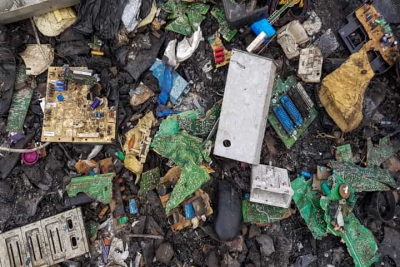New Delhi, Nov 24, : While electronic waste generated in the Commonwealth of Independent States of Georgia and Georgia increased by 50% between 2010 and 2019, which is roughly the world average, only 3.2% was collected and managed safely, which is well below the 17.4 percent average worldwide, according UN’s first Wednesday report dedicated to the ewaste problem in the 12 former Soviet Union nations. The total regional ewaste rose from 1.7 Mt up to 2.5 Mt (an average 8.7kg per citizen), with Russia producing the most ewaste per inhabitant and absolute terms.
These findings were published in the first-ever “Regional E-waste Monitor CIS + Georgia”, produced by Sustainable Cycles (SCYCLE Programme) and co-hosted jointly by UN University (UNU), the UN Institute for Training and Research(UNITAR) in partnership with UN Environment Programme (UNEP).
The study found that although the region’s ewaste includes a wide range of products, three main categories dominate: temperature exchange equipment (e.g.Heating, air conditioning, refrigeration units, and large equipment (e.g.washing machines and ovens, as well as small equipment (e.g.77% of the total market is for kitchen equipment and vacuum cleaners.
Although the annual growth rate has slowed for almost all categories, it is still positive.
Negative growth rates are only seen in screens and monitors and small IT equipment.
The 2019 population of the Commonwealth of Independent States plus its region is 289.2 millions.Russia (143.9 million people in 2019), Ukraine (41.8 millions) and Uzbekistan (33.2million) are the most populous countries.Product purchasing power parity, or PPP, varies widely.
It can range from $3,000 per year in Tajikistan to $26,000 in Russia.
Strongly correlated with the PPP, the amount of e-waste per person was highest in Russia (11.3kg/inh) and lowest at Tajikistan (1.4kg/inh).
Ruediger Kuehr (Director of Sustainable Cycles Programme, SCYCLE) stated that E-waste is one of the fastest growing waste streams today and poses a significant threat both to health and sustainable development.
“But, few countries have comparable international e-waste statistics and many countries lack the ability to collect ewaste data at the national and regional levels.
This data is needed to monitor changes over time, establish international and national policies, limit ewaste generation, stop illegal dumping, promote recycling, and establish national and international policies.
This Regional E-waste Monitoring for the CIS + Georgia is the only one of its kind.It reviews e-waste legislation and management.It was created with the goal of improving understanding and interpretation of the problem as well as facilitating environmentally sound management of e–waste.
He said, “Such a summary permits for international comparisons.It contributes to the development regional e-waste managing systems that are more effective.”
Kees Balde, co-author of the United Nations University, stated that managing ewaste could be an opportunity for the region in terms of creating businesses and jobs in the recycling sector.
In 2019, CIS + Georgia generated 10 tonnes of gold, half a tonne rare earth metals and 1 million tonnes iron.There were also 85,000 tonnes copper, 136,000 tonnes aluminum, 700 tonnes cobalt, and $2.6 billion worth of secondary raw materials.
There were also hazardous substances in the 2019 region’s e-waste, including at least 2.4 tonnes mercury, 1.1 tons of cadmium and 8,100 tonnes lead.There were also 4,000 tonnes worth of brominated flame retardants, which pose a threat to human and environmental health.
vg/vd #decade #waste #Commonwealth #risen #Delhi
.







